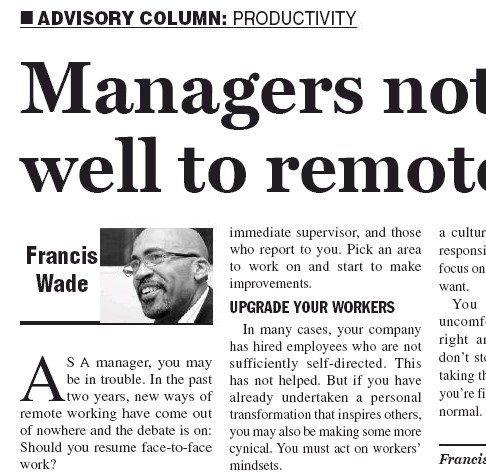As a manager, you may be in trouble. In the past two years, new ways of remote working have come out of nowhere and the debate is on: should you resume face-to-face working? Part of you wants work to be efficient, but another part hopes that everyone will come back to the office. Is this an unreasonable ask?
In your career, you probably have experienced a few micro-managers. With a patina of distrust, they hover over their people to ensure that they do what they are supposed to.
The sad fact is that this technique works, especially with manual workers. But it’s not faring well with knowledge workers. It’s hard to micro-manage in the COVID era. Why?
Stalking employees via WhatsApp or email messages just looks crazy. Installing software to inspect every keystroke feels like Big Brother. Calling staff randomly for casual “check-ins” can’t hide an unfortunate fact: they have lost their initiative.
The truth is, whatever intrinsic motivation they ever had has disappeared. Instead of being an excited newcomer to the organization, they have turned into drones. Now, they go through the motions, pretending to be engaged.
Consequently, you see yourself as the victim in all this…the unlucky recipient of poor employees. “If only I could get some good people,” you think, “I wouldn’t need to treat them this way.” You dream of a time when you could sit back as intrinsically motivated workers willingly produce their best work. How can you reach this end-point from where you are today?
- Fire Yourself
Here’s a shocking conclusion: your incompetence is showing.
What are you missing? The truth is: you don’t know how to manage people in a way that preserves their initial enthusiasm. Under your watch, staff with potential and energy become mediocre.
If this fits, consider getting rid of yourself: the part of you that COVID has revealed to be a weak manager. It may suggest that you quit the job, but here’s an alternative.
Instead, undertake a transformation in the way you manage. Start with a ruthless self-inventory of your performance. Ask for input from a coach, your immediate supervisor, and those who report to you. Pick an area to work on and start to make improvements.
- Upgrade Your Workers
In many cases, your company has hired employees who are not sufficiently self-directed. This has not helped. But if you have already undertaken a personal transformation that inspires others, you may also be making some more cynical. You must act on workers’ mindsets.
Partner with HR to build a process for identifying the most entrepreneurial recruits. Hint: they won’t be the ones who follow orders without question. Instead, look for people who could one day start their own business.
Why? An effective remote worker has more in common with a self-employed freelancer than a typical office worker. They manage their time, take responsibility for deliverables, and put work above insider-politics.
However, there will be some employees who can’t change fast enough.
- Transform the Culture
The majority of workers may not be bad: just used to an old way of doing business. It might be best to effect a cultural transformation.
In the change projects I have experienced, the end-result looks like an injection of personal responsibility. In other words, staff are willing to step up and say that things aren’t working, and publicly claim the part they are playing to fix them.
After all, the most responsible employees work well from anywhere. They empower themselves in the way they talk about their relationships. How? There’s almost no trace of the victim/poor-me stance taken by those who require constant supervision.
Once your organization starts to experience this shift, support the positive moves people make towards the ideal. Over-share so that folks come to see examples of self-motivation.
Also, paint a picture of how managers function in this new, remote dispensation. When behavior falls or degrades at any level, everyone should be able to identify it clearly.
But above all, resist a lazy slip into the way things used to work. For most companies, COVID has opened the door to a new kind of self-empowerment. Some staff have blossomed as a result.
Don’t drag them back to the office just because your least effective managers and workers are not delivering. Instead, forge a culture built around the most responsible staff. In other words, focus on creating more of what you want.
You are likely to feel uncomfortable waiting for the right answers to emerge. But don’t stop the search. You aren’t taking the path of least resistance; you’re fighting to bring forth a new normal.

